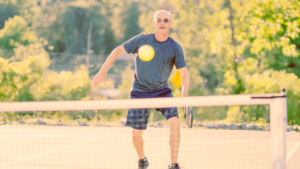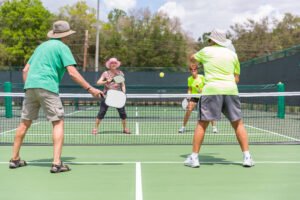Pickleball, the uproariously fun and addictively competitive sport, has captivated the hearts of players around the world. Picture this: an intense back-and-forth match, the sweltering sun casting its unforgiving rays on the court, adrenaline pumping through your veins. You’ve given it your all, maneuvering with finesse and executing flawless shots. But, alas, victory slips through your fingers at the eleventh hour, leaving you to swallow a bitter pill of defeat. In the world of pickleball, as in any pursuit, winning serves as an alluring elixir but, it is in gracefully accepting defeat that true character is unveiled. Through the ups and downs, the wins and losses, understanding and embracing the importance of being a gracious loser is what elevates not only your pickleball journey but your personal growth as well.
Table of Contents
- The Psychological Benefits of Gracefully Accepting Defeat in Pickleball
- Developing Mental Resilience: Learning from Losses in Pickleball
- The Key to Honing Skills: Embracing Defeat as Opportunities for Growth
- Fostering Good Sportsmanship: Building Positive Relationships on the Pickleball Court
- Strategies for Maintaining a Gracious Attitude in the Face of Failure
- Q&A
- Final Thoughts

The Psychological Benefits of Gracefully Accepting Defeat in Pickleball
When it comes to the game of pickleball, victory is not always guaranteed. Sometimes, despite our best efforts and strategic moves, we find ourselves on the losing side. However, gracefully accepting defeat in pickleball offers a multitude of psychological benefits that can enhance our overall well-being.
1. Emotional Resilience: Accepting defeat with grace allows us to develop emotional resilience. It teaches us how to cope with disappointment and setbacks, strengthening our ability to bounce back in challenging situations both on and off the court.
2. Humility and Sportsmanship: Gracefully accepting defeat in pickleball cultivates humility and sportsmanship. It reminds us that winning isn’t everything and allows us to appreciate the effort and skill of our opponents. By displaying good sportsmanship, we foster a positive and respectful playing environment.
3. Growth and Learning: Learning from defeat is a vital component of personal growth. Acceptance enables us to reflect on our mistakes, strategize better, and improve our playing skills. By embracing defeat, we open ourselves up to valuable lessons that can ultimately lead to future success.
4. Stress Reduction: Letting go of frustration and disappointment can have a profound effect on our stress levels. When we accept defeat gracefully, we release negative emotions and avoid unnecessary mental tension. This promotes a sense of relaxation and allows us to enjoy the game without the burden of resentment.

Developing Mental Resilience: Learning from Losses in Pickleball
In the competitive world of pickleball, losses are an inevitable part of the game. They can be disheartening and discouraging, but they also offer valuable opportunities for growth and development. Developing mental resilience is essential for any pickleball player aiming to reach their full potential. Here are some key strategies to learn from losses and bounce back stronger than ever:
- Embrace the learning experience: Instead of dwelling on the negative emotions that come with a loss, embrace it as a learning experience. Reflect on your performance, analyze what went wrong, and identify areas for improvement. This mindset shift allows you to view losses as stepping stones towards progress.
- Focus on the process: Rather than solely fixating on the outcome of a match, shift your focus to the process. Concentrate on executing your skills, strategies, and techniques effectively. By immersing yourself in the present moment, you enhance your chances of success and minimize the impact of losses.
- Cultivate a positive mindset: Maintaining a positive mindset is crucial in developing mental resilience. Remember that even the most successful athletes face setbacks and losses. Use affirmations and visualization techniques to boost your confidence and maintain belief in your abilities. By approaching each game with a positive attitude, you can overcome losses and come back stronger than ever before.
Remember, losses are not failures. They are opportunities for growth and improvement. By implementing these strategies, you can develop the mental resilience necessary to navigate through losses and ultimately elevate your pickleball game to new heights.

The Key to Honing Skills: Embracing Defeat as Opportunities for Growth
When it comes to honing our skills, there is a hidden key that many fail to recognize – the art of embracing defeat as opportunities for growth. Our instinct is to shy away from failure, to see it as a setback or a sign of weakness. However, if we shift our perspective, we can unlock an incredible source of personal development.
One way to embrace defeat is by reframing it as a learning experience. Every time we face failure, we have the chance to evaluate what went wrong and how we can improve. By examining our mistakes and shortcomings, we can identify areas that need attention and make adjustments accordingly. This self-reflection not only sharpens our skills but also fosters resilience and a growth mindset.
To truly embrace defeat, we must also let go of fear and ego. Failure often exposes our vulnerabilities and challenges our confidence. By acknowledging and confronting these limitations, we open ourselves up to new possibilities and opportunities. It is important to remember that no one becomes a master overnight, and setbacks are a stepping stone towards mastery.
- Take risks: Embracing defeat requires stepping out of our comfort zones and taking risks. By pushing ourselves to try new things, we create room for growth and increased skill development.
- Seek feedback: Feedback is invaluable in our quest for improvement. Actively seeking constructive criticism helps us identify blind spots and gain different perspectives, ultimately enhancing our skills.
- Practice resilience: Resilience is the ability to bounce back from failure. It involves accepting defeat, learning from it, and moving forward with renewed determination. Cultivating resilience allows us to develop our skills even in the face of adversity.
By embracing defeat, we transform setbacks into stepping stones and failures into fuel for growth. It is through these experiences that we truly hone our skills and reach new levels of achievement. So let us embrace defeat with open arms and savor the opportunities it presents for personal and professional growth.
Fostering Good Sportsmanship: Building Positive Relationships on the Pickleball Court
When stepping onto the pickleball court, it is essential to remember that this sport is not only about winning but also about building positive relationships with your fellow players. Good sportsmanship is the cornerstone of any enjoyable game, creating a welcoming environment where respect, fairness, and camaraderie thrive. So, how can we foster good sportsmanship on the pickleball court?
- Start with a smile: A warm smile goes a long way in setting the tone for a friendly match. It shows that you are approachable and ready to engage in a positive way with your teammates and opponents.
- Be a good listener: Take the time to listen to your fellow players. Whether they’re offering tips, discussing strategy, or simply sharing a funny anecdote, actively listening shows that you value their input and allows for better communication.
- Celebrate good play: Whether it’s your own or your opponents’, acknowledging and appreciating good shots or impressive moves can help create a supportive atmosphere on the court. A friendly nod, a high-five, or a well-deserved compliment can make a huge difference in boosting morale and encouraging further sportsmanship.
- Stay positive: Even if things don’t go as planned, maintaining a positive attitude is crucial. Avoid negative or derogatory comments towards your teammates or opponents, and instead focus on finding solutions and motivating each other to improve their performance.
- Set an example: As a player, you have the power to inspire others with your actions. Demonstrating fairness, honesty, and integrity in every match will encourage those around you to do the same. Remember, whether you win or lose, it’s how you play the game that truly matters.
By actively incorporating these practices, we can build a pickleball community that values good sportsmanship and fosters positive relationships both on and off the court. Let’s remember that the true spirit of the game lies not only in the competition but also in building connections that can last a lifetime.
Strategies for Maintaining a Gracious Attitude in the Face of Failure
When faced with failure, maintaining a gracious attitude can be challenging, but it is essential for personal growth and resilience. Here are some effective strategies to help you embrace failure with grace:
- Practice self-compassion: Instead of beating yourself up over mistakes or setbacks, be kind and understanding towards yourself. Treat failure as an opportunity to learn and grow, and remember that everyone experiences setbacks on their journey towards success.
- Cultivate a growth mindset: Embrace failures as stepping stones towards improvement. Adopt a mindset that believes abilities and talents can be developed through hard work and dedication. View mistakes as valuable lessons and opportunities for growth rather than as personal deficiencies.
- Focus on the positives: Shift your attention to the positive aspects of the situation. Reflect on the lessons learned, the progress made, or the strength gained from the experience. By reframing failure, you can extract valuable insights and keep your attitude gracious.
- Seek support: Surround yourself with a supportive network of family, friends, or mentors who can provide encouragement and perspective during challenging times. Their guidance and reassurance can help you maintain a gracious attitude when faced with failure.
- Practice gratitude: Develop a habit of expressing gratitude for the opportunities and experiences that come your way, including both successes and failures. By acknowledging the lessons learned from failures, you can cultivate a sense of appreciation for the growth and resilience they bring.
Q&A
Why is being a gracious loser important in pickleball?
Being a gracious loser in pickleball is important because it shows respect for your opponents and the sport. It helps maintain a positive and friendly atmosphere on the court, promoting sportsmanship and fair play.
Does being a gracious loser affect your long-term growth as a player?
Absolutely! Being a gracious loser allows you to learn from your mistakes and shortcomings. It helps you stay motivated and open to improvement, ultimately leading to long-term growth as a player.
How can being a gracious loser improve your relationships with fellow players?
By being a gracious loser, you build strong and healthy relationships with fellow players based on mutual respect. It creates a supportive community where everyone feels valued, fostering a sense of camaraderie and friendship.
Can being a gracious loser positively impact your overall mental well-being?
Indeed! Being a gracious loser reduces stress and frustration as you accept defeats with dignity. It promotes a positive mindset, which can enhance your mental well-being both on and off the pickleball court.
Is being a gracious loser a sign of weakness?
Not at all! Being a gracious loser requires strength and character. It takes courage to accept defeat gracefully, respect your opponents, and learn from your mistakes. It demonstrates maturity and inner resilience rather than weakness.
Are there any strategies to help you become a more gracious loser?
Yes! Focus on your own improvement rather than solely on winning. Celebrate your opponents’ successes, and offer sincere compliments. Take defeat as an opportunity to learn, grow, and come back stronger in the next match.
Can being a gracious loser inspire others to follow your example?
Absolutely! Your gracious attitude can act as an inspiration and encourage others to maintain a positive and respectful approach to the game. Your actions have the power to influence and create a ripple effect within the pickleball community.
Final Thoughts
As our pickleball journey comes to an end, we are reminded of the profound significance of embracing the art of being a gracious loser. In the fast-paced world of competitive sports, where victories and defeats intertwine, there lies a lesson that transcends the confines of the game. It is a lesson that invites us to reflect on our character, humbling us in the face of adversity and showing us the true measure of our sportsmanship.
Pickleball, with its electrifying rallies and strategic maneuvers, exhilarates players and spectators alike, igniting a fire within eager competitors. Yet, as we mercilessly chase victory, we often overlook the virtues of resiliency and respect for our fellow players. Our egos may crave the glory of winning, but the true essence of this vibrant sport lies in the mutual growth and camaraderie that come from both triumphs and failures.
Today, we have embarked on a journey that celebrates compassion and empathy, values we often leave behind in the race for success. In pickleball, as in life, our true character is exposed in the face of defeat. Will we lash out in anger, blaming our equipment, our partners, or even fate itself? Or will we rise above and display the depths of our humanity, demonstrating grace, dignity, and reverence for the game we hold dear?
Being a gracious loser is an art in itself, requiring patience, humility, and an unwavering belief in the power of sportsmanship. It is an opportunity to acknowledge the skill and determination of our opponents, to honor the hours of practice they dedicated, and to celebrate the shared love for this intricate dance we call pickleball. In defeat, we are offered a glimpse into our own limitations, pushing us to grow and evolve, becoming better not only on the court but also in everyday life.
The game teaches us that life is not a series of wins but rather a continuous learning experience, where the true essence of victory lies in personal growth and the connections we forge. By being a gracious loser, we create a ripple effect that extends far beyond the boundaries of the pickleball court. We inspire others to embrace humility and kindness, inviting them to engage in a battle of mutual respect rather than ego-driven triumphs.
So, as the final point slips away and the echoes of victory fade, let us remember the profound importance of being a gracious loser in pickleball. Let us cherish the moments of triumph and setbacks alike, for they shape us into the remarkable sportsmen and sportswomen we aspire to be. In a world often overshadowed by rivalries and animosity, let us be the embodiment of tolerance and understanding, carrying the spirit of pickleball within us wherever we go.
As pickleball enthusiasts, we have the power to redefine the very essence of competition, making it a celebration of shared experiences and personal growth. So, next time you step on the pickleball court, remember that being a gracious loser may just be the greatest victory of all.
As an affiliate, my content may feature links to products I personally use and recommend. By taking action, like subscribing or making a purchase, you’ll be supporting my work and fueling my taco cravings at the same time. Win-win, right?
Want to read more? Check out our Affiliate Disclosure page.




